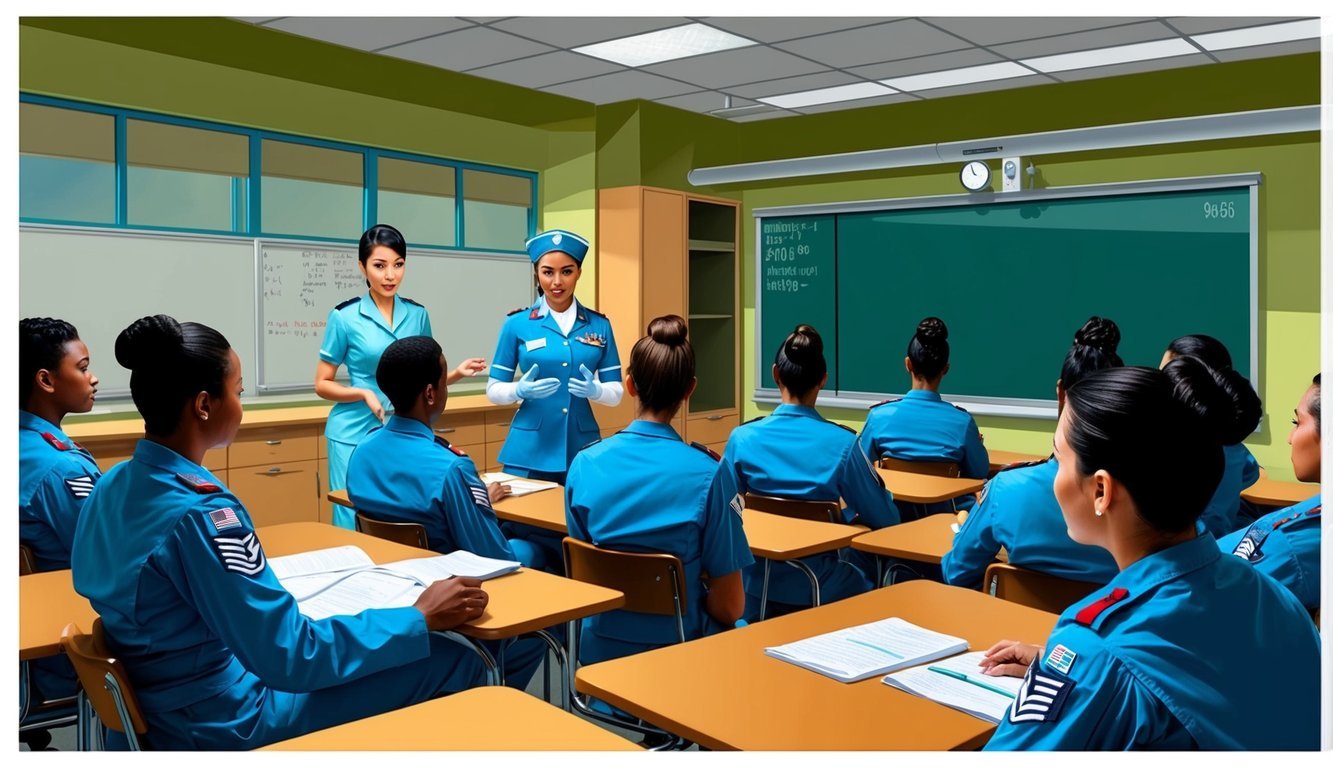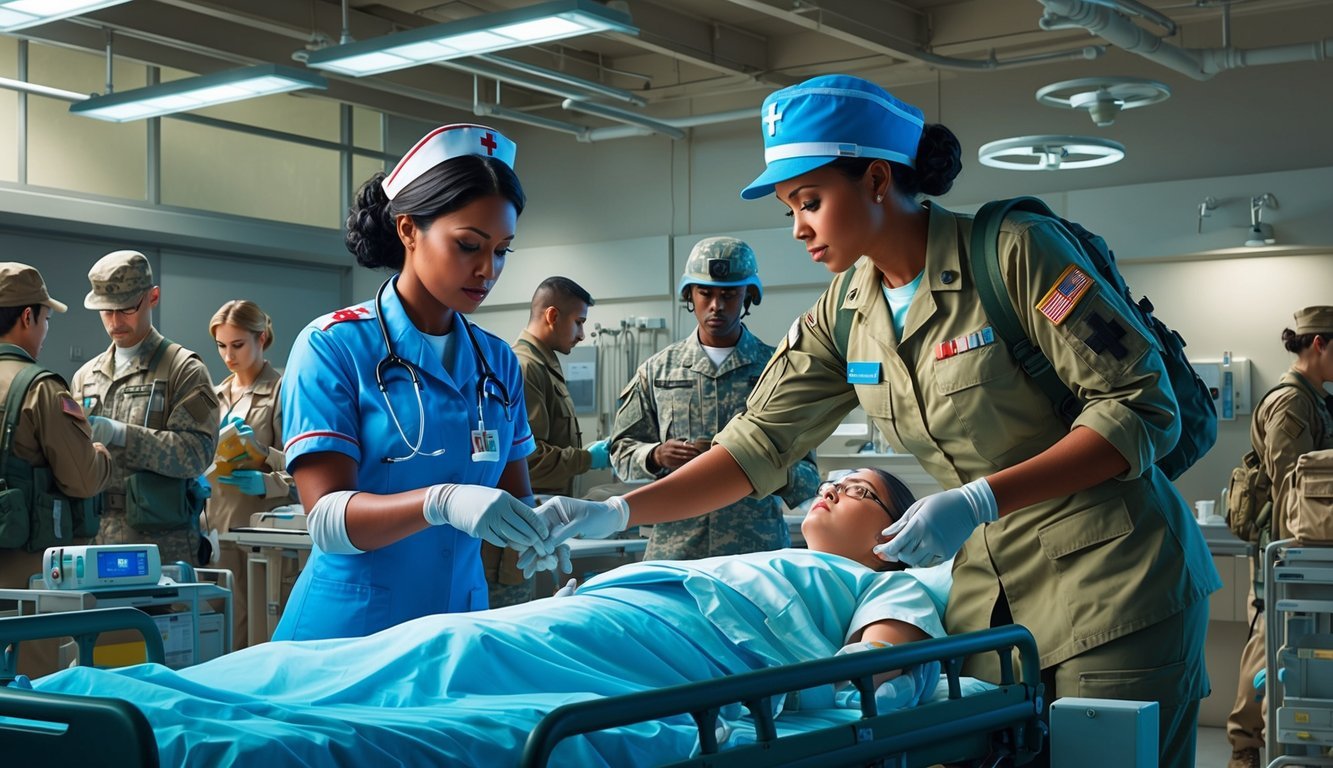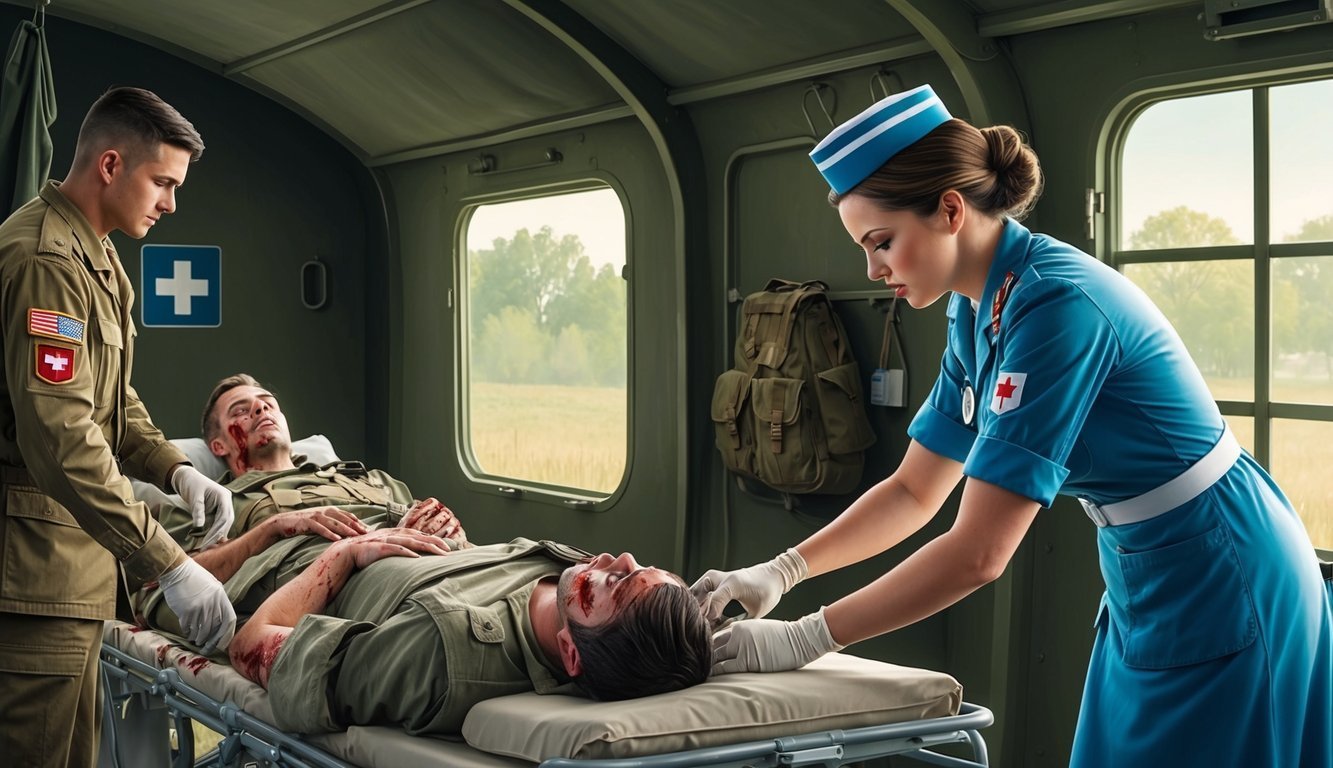Military nursing is a unique and rewarding field that plays a vital role in the healthcare of military personnel.
As a military nurse, you provide essential medical care in a variety of settings, from military hospitals to deployed environments.
This career not only demands clinical skills but also offers opportunities for personal growth and professional development.
The path to becoming a military nurse typically starts with obtaining a Bachelor of Science in Nursing (BSN) and joining the U.S. Armed Forces as a commissioned officer.
You will face challenges such as deployment to active combat zones, but you will also enjoy numerous benefits, including specialized training and financial incentives.
Your role is not just about medical care; it includes being adaptable and ready to support your fellow service members in times of need.
Military nurses are essential to maintaining the health and readiness of our armed forces.
If you have a passion for nursing and a desire to serve, this career could be the perfect match for you.
Key Takeaways
- Military nursing requires a BSN and offers diverse roles in healthcare.
- You will face unique challenges while gaining professional advancement opportunities.
- This career provides significant benefits to military personnel and contributes to their well-being.
Education and Training Pathways

To become a military nurse, you need a strong educational background and specific training.
This includes obtaining the right nursing degree and completing officer training to prepare for military duties.
Obtaining a Nursing Degree
Your first step is to earn a nursing degree.
Most military branches require a Bachelor of Science in Nursing (BSN) degree.
This program typically takes four years and provides essential knowledge and skills.
You can also pursue an Associate Degree in Nursing (ADN), which takes about two years.
However, a BSN is preferred for entry into military service.
After completing your degree, you must pass the NCLEX-RN exam to obtain your RN license.
Consider programs that offer student loan repayment options, which can help reduce financial burdens after graduation.
For more details on nursing programs, visit Nursing Education.
Officer Training and Military Preparation
Once you have your BSN, you will enter officer training.
This training focuses on leadership skills and military protocols.
It usually covers basic military tactics, physical training, and healthcare management.
You must demonstrate your ability to lead and work under pressure.
Training also helps you adapt to military life and work in various settings, such as military hospitals and clinics.
Upon successful completion of training, you will be commissioned as an officer in the military, ready to serve as a military nurse.
This preparation is essential for providing high-quality care to service members and their families.
Military Nursing Roles and Responsibilities
Military nursing encompasses a range of critical roles with specific responsibilities designed to meet the unique needs of military personnel and their families.
Nurses in this field often work in high-pressure environments, requiring specialized skills and training.
Clinical Nurse Specialists and Nurse Practitioners
Clinical Nurse Specialists (CNS) and Nurse Practitioners (NP) play vital roles in military settings.
These nurses have advanced training and provide comprehensive care.
They often focus on specialized areas such as mental health, pediatrics, or trauma care.
Key Responsibilities:
- Assessing and diagnosing patient conditions.
- Creating and implementing care plans.
- Leading patient education initiatives.
CNSs and NPs use strong leadership skills and clinical experience to mentor junior nurses.
They also collaborate with physicians and other healthcare team members to ensure high-quality care in military hospitals and trauma centers.
Their role may involve triage in emergency situations, ensuring that the most critical patients receive urgent care.
Critical Care and Emergency Nursing
Critical Care and Emergency Nursing are essential components of military nursing.
These specialties involve caring for patients with life-threatening conditions, often in chaotic environments.
Key Aspects:
- Rapid assessment and intervention in critical situations.
- Monitoring vital signs and administering medications.
- Working in trauma centers during deployments or emergencies.
Critical care nurses possess specialized training that allows them to handle complex medical equipment and provide intensive monitoring.
Their ability to make quick decisions can significantly affect patient outcomes.
Emergency nurses must also remain calm under pressure, demonstrating resilience and stamina.
They often lead teams in triage situations, ensuring patients receive appropriate levels of care quickly.
For more information on military nursing, you can visit Military Nurse Career Overview.
Working Environment and Deployment

Military nursing presents unique challenges and demands that require specialized skills.
Understanding the working environments, including military hospitals and field assignments, is crucial for effective care delivery and patient outcomes.
Military Hospitals and Clinics
In military hospitals and clinics, you provide medical care to active-duty personnel, veterans, and their families.
These facilities are equipped to handle a wide range of health issues, from routine check-ups to advanced surgical procedures.
Military hospitals often have specialized units such as trauma care, orthopedic wards, and emergency services.
You may work within the Army Nurse Corps, Navy Nurse Corps, or Air Force Nursing, each with its own protocols and procedures tailored to military needs.
The focus is on delivering high-quality care that improves patient outcomes.
Continuous training ensures you stay updated on best practices and military health policies.
Field Assignments and Triage Units
Field assignments require military nurses to work in challenging conditions.
You may be stationed in remote or combat zones where resources are limited.
Triage units play a vital role in these settings, enabling you to assess and prioritize patient care effectively.
During deployment, you will encounter emergencies that require quick decision-making and resourcefulness.
You may provide care in makeshift clinics or on the battlefield, addressing critical injuries and illnesses.
Your ability to adapt to changing environments is essential.
Military training prepares you for these situations, emphasizing quick thinking, teamwork, and efficiency.
Supporting fellow service members under pressure demands resilience and compassion.
Career Advancement and Professional Development
In military nursing, advancing your career and developing professionally is essential.
You have various paths available that focus on continuing education and leadership roles.
Continuing Education
Continuing education is vital for military nurses.
It helps you stay updated on the latest medical practices and advances in nursing.
You can pursue additional degrees, such as a Bachelor of Science in Nursing (BSN) or a Master of Science in Nursing (MSN).
These degrees can improve your skills and job prospects.
You may also consider obtaining a military nurse certification.
This certification demonstrates your expertise and commitment to professional growth.
Many military nursing programs offer online courses that fit your schedule, allowing you to balance work and study effectively.
Leadership Opportunities and Military Rankings
In your military nurse career, there are ample leadership opportunities available.
As you gain experience, you can rise through the ranks of military service.
Each rank comes with increased responsibilities and more authority.
You may have the chance to take on roles like Charge Nurse, Nurse Supervisor, or Nurse Educator.
These positions often require you to lead teams and manage patient care effectively.
Participating in Officer Training School can also enhance your leadership skills.
Training at locations like Maxwell AFB equips you with essential skills for management and decision-making roles.
Climbing the ranks and taking additional responsibilities can significantly impact your career growth and job satisfaction.
Benefits and Challenges of a Military Nursing Career

A career in military nursing offers unique advantages and significant challenges.
You will find attractive compensation and benefits, but the demands of military life can be intense.
Here’s a closer look at what you can expect.
Compensation and Incentives
Military nursing provides competitive pay and various benefits.
Here are some key aspects:
- Base Salary: The annual salary for military nurses varies based on experience. For instance, salaries range from about $61,500 to $118,000 according to different experience levels. The average is around $80,321.
- Sign-On Bonuses: Many branches offer sign-on bonuses to attract qualified healthcare professionals eager to join.
- Hazard Pay: Nurses working in high-risk areas may receive additional hazard pay.
- Retirement Plans: Military nurses enjoy comprehensive retirement plans that enhance long-term financial security.
Benefits extend beyond salary, including tuition assistance for further education.
This support can help advance your career and professional skills.
Lifestyle and Commitment
The lifestyle of a military nurse can be demanding.
Here are some critical points to consider:
- Active Duty and Reserves: You can serve in the active duty or reserve components, like the Air Force Reserve. Each path has unique commitments and responsibilities.
- Physical Fitness: Maintaining physical fitness is essential. Regular fitness evaluations are part of military life.
- Support Network: There is a strong sense of camaraderie among military healthcare professionals. This support network can be crucial during challenging times.
- Job Outlook: The demand for military nurses continues to grow, which can lead to promising career opportunities.
Be prepared for the physical and emotional demands that come with military service while enjoying the benefits that enhance both your personal and professional life.
Frequently Asked Questions
Military nursing offers unique opportunities and experiences.
Here are answers to some common questions regarding education, salary, job opportunities, age requirements, and challenges faced by military nurses.
What are the educational requirements for a military nurse?
To become a military nurse, you need a Bachelor of Science in Nursing (BSN).
This degree typically takes four years to complete.
If you have an Associate Degree in Nursing (ADN), you can pursue an RN-to-BSN program to earn your bachelor’s degree in a shorter time frame, usually between 9 to 24 months.
For more information, visit the NurseJournal.
How does the salary of a military nurse compare to civilian nursing?
Military nurses often receive competitive salaries, but their pay can vary based on rank, experience, and duty station.
Generally, military nurses earn a salary comparable to civilian counterparts, with additional benefits such as housing allowances and bonuses available.
What job opportunities are available for nurses in the military?
Military nurses can work in various roles, including medical-surgical nursing, critical care, pediatrics, and mental health.
Opportunities exist across different branches of the military, allowing nurses to serve in diverse settings, such as hospitals, clinics, and field hospitals.
What are the age limitations for becoming a military nurse?
Typically, you must be between 21 and 42 years old to become a military nurse.
These age limits can vary slightly between the different branches of the military, so it’s essential to check specific requirements for the branch you are interested in.
Which military branch offers the best opportunities for nurses?
Each military branch has its own nursing corps.
The Army Nurse Corps is one of the largest and offers a wide range of specialties and career advancement opportunities.
However, the choice also depends on personal career goals and interests.
What are some potential challenges faced by nurses in the military?
Military nurses may encounter challenges such as deployment to hazardous areas, long hours, and high-stress situations.
They must adapt to unique working environments and provide care under pressure.
This can be demanding both mentally and physically.

